Graham Reid | | 4 min read
Slim Whitman: The Love Song of the Waterfall
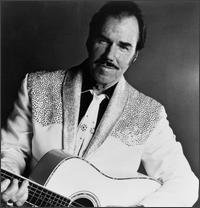
In the early Eighties, the late Slim Whitman – who had recorded more than 65 albums -- still held down the record for the longest number one on the British charts, 11 consecutive weeks, a feat unmatched by Elvis or the Beatles.
But back home in the States he was a singer without a
song. He was a household name but few Americans could name a song by
him.
And despite that phenomenal recording
output and living in Florida, he was a huge star in Britain.
His popular, light country and standards
repertoire, all sung in his distinctive style which included a
soaring falsetto and effortless yodel, had won him a devoted
following and yet, throughout the Seventies, he fell into obscurity
in America.
The Slim Whitman story is one of fame
and obscurity, and a meteoric rise again which can be pinpointed
almost down to a day in December 1980.
Born in Tampa, Florida, Slim Whitman
(born Ottis Dewey Whitman) did everything in his youth and teenage
years except sing. He was a meatpacker and postman, did military
service in the Navy and was a better than average baseball player who
seriously considered turning pro.
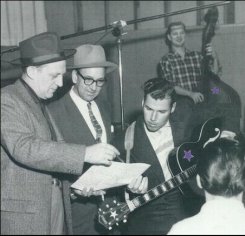 But then, with a friend from the
shipyard where he was working, he put together a small band and came
to the attention of Colonel Tom Parker in 1949, the man later to
become Elvis Presley's manager.
But then, with a friend from the
shipyard where he was working, he put together a small band and came
to the attention of Colonel Tom Parker in 1949, the man later to
become Elvis Presley's manager.
Parker recommended Whitman to RCA
Records and his song, Casting My Lasso to the Sky won him a spot on
the Louisiana Hayride and eventually the Grand Ole Opry.
Throughout the Fifties, Whitman scored
hit after hit with songs like North Wind, Rose Marie - the song which
still holds the British chart record - China Doll, Love Song of the
Waterfall and Indian Love Call.
Throughout the Sixties Whitman’s star
kept ascending, especially in Britain and Australia, where his albums
of popular standards sold huge quantities. Ironically, however, he
was less well-received in his homeland, and by the time the Seventies
rolled around Whitman was becoming a forgotten man.
In fact, he only performed in America
twice during the whole of the Seventies, the final time in 1972.
And then, almost literally overnight,
Whitman was a star again.
Malcolm Smith, head of a New York mail
order record company, convinced Whitman to make a television
commercial to promote a greatest hits album.
“I never liked television,” Whitman
told me in the late Eighties, “but my wife kept telling me I had
nothing to lose. Then my son Byron insisted I do it. So I did.”
In some press the advertisement drew
oceans of derision. Playboy magazine skewered Whitman viciously.
“With a hairline that can't quite decide where it's receding to, a pair of front teeth you could pass a table knife between and a dazzling black suit of rhinestone and polyester, Slim was the most arresting screen image since Yoda," wrote Kate Nolan.
Others were equally cruel, but the ad
worked.
The album sold more than two million
copies, an unprecedented number for a mail-order record, His next
album, Songs I Love to Sing, sold a quarter of a million copies and
by the late Eighties he was shifting about that number every year of
his records.
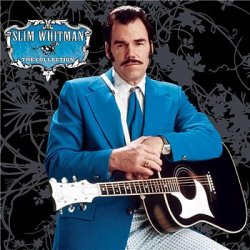 The Eighties saw the second coming of
Whitman as he took to the road with his son, Byron.
The Eighties saw the second coming of
Whitman as he took to the road with his son, Byron.
With Byron delivering pop standards
like Only The Lonely and old Elvis songs, and father Slim serving up
his own country classics and popular material like Ramblin' Rose and
Ramona, the pair brought out a cross-section of people which even surprised them.
After 18,000 teenagers surged forward
at a show in Atlanta, Whitman was amazed.
“They were hysterical, trying to jump
over the barriers and touch us,” he told Us magazine. “Then they
started flicking their cigarette lighters. I wasn't sure what that
meant.
Byron had to tell me, ‘It means they
like you.‘ "
Despite that acclaim, Whitman – who
really played the demanding star with promoters it should be said –
kept things in perspective.
“I never would deny anyone a
handshake or autograph. You meet the same people going down as you
meet going up. I’ve had so many ups and downs I try to treat
everybody nice."
The Whitman revival rolled on through the Nineties and beyond when Indian Love Call was used in the '96 film Mars Attacks! to save the world from Martian invaders, and his songs turned up in Rob Zombie's House of 1000 Corpses (2003).
In
Walk Hard; The Dewey Cox Story it is Whitman who is cited as the only
musician to ever make money.
And he did, thanks to a television ad which earned the derision of Playboy, today an empire more in danger of failing than Whitman's.
Slim Whitman died in Florida in June 2013. He was 90

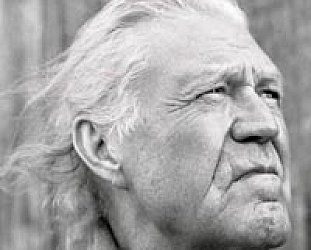

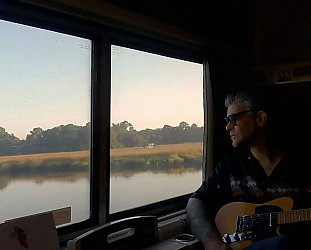
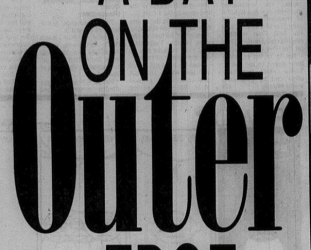
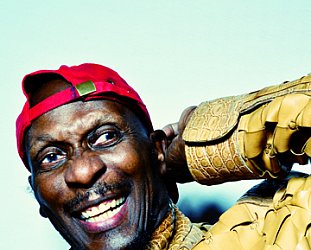
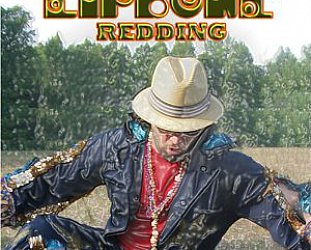
post a comment